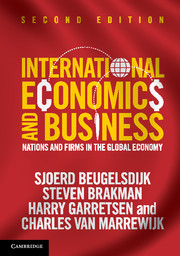Book contents
- Frontmatter
- Contents
- List of figures
- List of tables
- List of boxes
- Preface
- Part I Introduction
- Part II Firms, trade, and location
- 3 Trade, comparative advantage, and competition
- 4 Modern trade theory: the role of the firm
- 5 Trade restrictions and trade policy
- 6 Firms, location, and distance
- 7 Managing across borders
- Part III Capital, currency, and crises
- Part IV Consequences of globalization
- Bibliography
- Author index
- Subject index
4 - Modern trade theory: the role of the firm
from Part II - Firms, trade, and location
- Frontmatter
- Contents
- List of figures
- List of tables
- List of boxes
- Preface
- Part I Introduction
- Part II Firms, trade, and location
- 3 Trade, comparative advantage, and competition
- 4 Modern trade theory: the role of the firm
- 5 Trade restrictions and trade policy
- 6 Firms, location, and distance
- 7 Managing across borders
- Part III Capital, currency, and crises
- Part IV Consequences of globalization
- Bibliography
- Author index
- Subject index
Summary
Keywords
Intra-industry trade • Internal returns to scale • Love-of-variety effect • Grubel–Lloyd index • Gains from trade • Strategic industrial policy • Monopolistic competition • Firm heterogeneity
Trade and imperfect competition
The explanations for international trade flows based on comparative advantage (driven by differences in technology or factor abundance) greatly enhance our understanding of the benefits of international (partial) specialization, the division of labour, and the implications for international trade flows. These theories, however, are especially useful to explain so-called inter-industry trade flows – that is, trade in different types of commodities, such as wine for cloth, or iron ore for tuna fish. However, a large part of international trade flows is of the intra-industry type – that is, similar trade within one broader category, such as the exchange of television sets for television sets, cars for cars, or engineering services for engineering services. This type of trade might seem wasteful at first sight. Why would you import something you can not only produce yourself but you are also exporting? Although first noted by Verdoorn (1960), the importance of intra-industry trade flows became clear after the influential empirical study by Grubel and Lloyd (1975), who demonstrated that a substantial part of international trade flows is of the intra-industry type (see Box 4.1). It posed a problem for trade theorists because the two models they had at their disposal – the Ricardo (technology) model and the Heckscher–Ohlin (factor-abundance) model – are ill-suited for explaining intra-industry trade. It was not until the late 1970s and the early 1980s that trade theorists were able to meet this challenge by incorporating imperfect competition into their models to explain intra-industry trade. In the late 1990s new sources of data became available: individual firm data. These new data sources revealed large differences between firms within sectors. This evidence suggests that models that assume that firms are identical should be treated with care. Again the result is that these new data stimulated theorists to come up with models that are able to deal with these new facts.
- Type
- Chapter
- Information
- International Economics and BusinessNations and Firms in the Global Economy, pp. 105 - 131Publisher: Cambridge University PressPrint publication year: 2013



